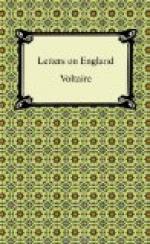Voltaire’s OEdipe was played with success in November, 1718. A few months later he was again banished from Paris, and finished the Henriade in his retirement, as well as another play, Artemise, that was acted in February, 1720. Other plays followed. In December, 1721, Voltaire visited Lord Bolingbroke, who was then an exile from England, at the Chateau of La Source. There was now constant literary activity. From July to October, 1722, Voltaire visited Holland with Madame de Rupelmonde. After a serious attack of small-pox in November, 1723, Voltaire was active as a poet about the Court. He was then in receipt of a pension of two thousand livres from the king, and had inherited more than twice as much by the death of his father in January, 1722. But in December, 1725, a quarrel, fastened upon him by the Chevalier de Rohan, who had him waylaid and beaten, caused him to send a challenge. For this he was arrested and lodged once more, in April, 1726, in the Bastille. There he was detained a month; and his first act when he was released was to ask for a passport to England.
Voltaire left France, reached London in August, 1726, went as guest to the house of a rich merchant at Wandsworth, and remained three years in this country, from the age of thirty-two to the age of thirty-five. He was here when George I. died, and George II. became king. He published here his Henriade. He wrote here his “History of Charles XII.” He read “Gulliver’s Travels” as a new book, and might have been present at the first night of The Beggar’s Opera. He was here whet Sir Isaac Newton died.
In 1731 he published at Rouen the Lettres sur les Anglais, which appeared in England in 1733 in the volume from which they are here reprinted.
H.M.
LETTERS ON ENGLAND
LETTER I.—ON THE QUAKERS
I was of opinion that the doctrine and history of so extraordinary a people were worthy the attention of the curious. To acquaint myself with them I made a visit to one of the most eminent Quakers in England, who, after having traded thirty years, had the wisdom to prescribe limits to his fortune and to his desires, and was settled in a little solitude not far from London. Being come into it, I perceived a small but regularly built house, vastly neat, but without the least pomp of furniture. The Quaker who owned it was a hale, ruddy-complexioned old man, who had never been afflicted with sickness because he had always been insensible to passions, and a perfect stranger to intemperance. I never in my life saw a more noble or a more engaging aspect than his. He was dressed like those of his persuasion, in a plain coat without pleats in the sides, or buttons on the pockets and sleeves; and had on a beaver, the brims of which were horizontal like those of our clergy.




